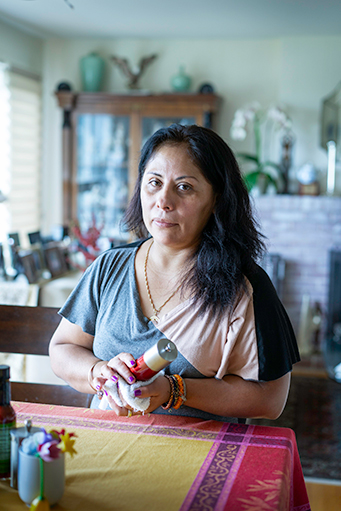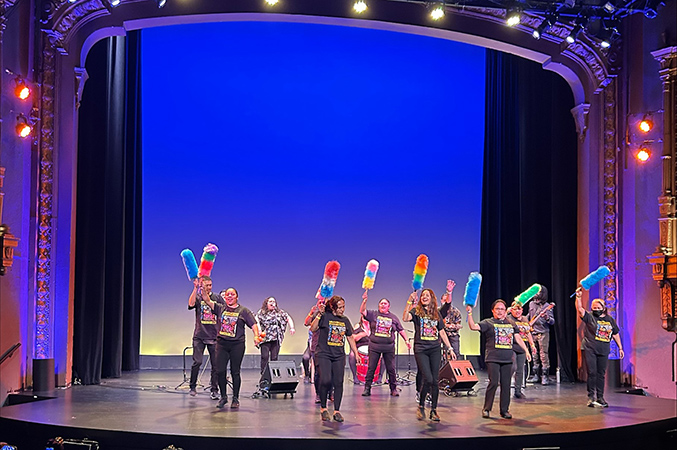Members of the California Domestic Workers Coalition speak with attendees at a recent screening of Dignidad. (Photo courtesy of Jose L. Lopez Garcia, UC Davis Research Associate)
The NIEHS-funded Environmental Health Sciences Core Center at the University of California (UC) Davis released a documentary in January 2023 that describes workers’ quest to improve their health and safety within the household domestic service industry in California. The documentary,”Dignidad: Domestic Workers’ Journey for Justice in California,” features results from a report that describes how the COVID-19 pandemic affected these workers.
The report was based on results from a survey, which was developed and administered as a collaboration between the California Domestic Workers Coalition and the UC Davis team. The survey was tailored for domestic workers to better understand working conditions and the impact the pandemic had on them. The coalition then used the research results to support policy change that would better protect domestic workers.
“While environmental health research results can help community members better understand their health risks, using the data to do something about the risks is key to reducing environmental and occupational health burdens,” reflected Irva Hertz-Picciotto, Ph.D., principal investigator of the study and executive director of the documentary. “The California Domestic Workers Coalition has been advocating for several years for policy change that would provide domestic workers with the protections enjoyed by most other workers. In September 2021, they finally were able to move the dial in the right direction. We are proud to share this story through Dignidad.”
Addressing Workplace Protections for Domestic Workers
Rules provided by California’s Occupational Health and Safety Act (Cal/OSHA) protect workers from conditions that may cause harm to their health and safety; however, domestic workers, which include nannies, house cleaners, and home attendants, who are employed in a home setting are not included. During the COVID-19 pandemic, workplace protections included employer-provided masks, enforcement of social distancing, and information on the risks of catching COVID, but domestic workers employed by households were often without these protections.
To learn more about work conditions, the researchers surveyed 164 domestic workers, of whom 95% were women and 82% Hispanic, reflecting demographics consistent with those of the overall domestic worker workforce across the United States.
The survey was conducted before the release of the first COVID-19 vaccine. Practices such as wearing a mask, social distancing, and keeping away from sick individuals were, at the time, the best means of preventing infection and illness.
Researchers concluded from survey data that domestic workers had three times the risk of having COVID-19 compared to the general California population, and approximately one-third believed they caught COVID at work. Responses also indicated household employers were not enforcing COVID-19 guidelines. When asked whether masks were provided by their employers, 77% of workers stated they were not provided with a mask. Further, 75% of survey respondents stated that their employers did not provide information about COVID risks, such as entering the home of a client known to be COVID-positive. Additionally, 59% of employers did not enforce social distancing.
“As a result of exclusion from Cal/OSHA, a workforce that is mostly made up of immigrants and women of color did not have protective equipment, training, or information about risks at work, during the height of a global pandemic,” said Kimberly Alvarenga, Director of the California Domestic Workers Coalition. “We are thankful for the partnership with UC Davis to conduct this research to shine a light on the impacts of this historic exclusion and to help bolster our efforts to get the protections this essential workforce needs.”
Hertz-Picciotto added, “Results from our research confirmed many of the domestic workers’ concerns about the lack of measures taken to protect them at their workplaces during the COVID-19 pandemic. The results helped them advocate for greater workplace protections.”

A member of the California Domestic Workers Coalition at work in a client’s home. (Photo courtesy of Megan Whelan)
Telling the Story of Worker Health and Safety Advocacy Through Film
The UC Davis team documented both the workers’ stories about COVID-19 in the workplace and the California Domestic Workers Coalition’s efforts to advocate for protections. Hertz-Picciotto also appears in the film to describe the UC Davis team’s role, and the importance of worker health and safety.
“Making a film is one of the best ways to engage a broad public,” stated Hertz-Picciotto. “The domestic workers and their needs are the focus of the research, and the day-to-day realities of their lives are front and center in the film.”
Dignidad features several domestic workers who tell their stories. In one example, a home attendant for the elderly and disabled describes his passion for his work, but also reflects on how he struggled in dealing with a lack of protections from COVID-19. He believes his hospitalization with COVID-19 was a result of infection on the job. He is now an advocate for the Pilipino Workers Center, which works to ensure the safety of the Filipino community and supports the domestic worker industry in southern California.
The documentary also traces the story of advocates’ ongoing efforts to receive protections for domestic workers under Cal/OSHA.
In 2021, California amended Cal/OSHA policies to create voluntary guidelines for employers, including provisions to ensure domestic worker safety. These guidelines were developed by an advisory committee that included domestic workers and employers, but workers in household settings still do not benefit from the full protection of Cal/OSHA regulations.

Members of the California Domestic Workers Coalition join the stage after a recent screening of Dignidad. (Photo courtesy of Jose L. Lopez Garcia, UC Davis Research Associate)
Megan Whelan, Associate Director of the California Domestic Workers Coalition, added: “These new guidelines are a critical first step to providing workers who are central to our economy with the health and safety protections they deserve in their workplaces.”
Source link
www.niehs.nih.gov

